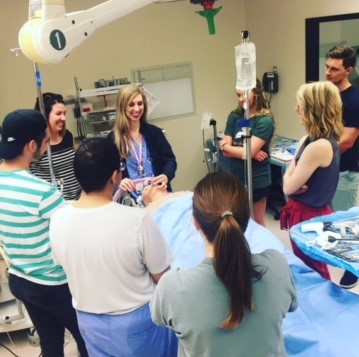
Welcome to the Department of Anesthesiology and Critical Care Medicine! The University of Oklahoma Health Sciences Center welcomes OU medical and visiting students to explore the variety of opportunities available on our campus to learn more about our specialty and engage in meaningful clinical, educational, and simulated experiences.
Whether you’re trying to decide on anesthesiology as a career or you have chosen to pursue a different specialty altogether, rotating with the Department of Anesthesiology will provide an invaluable experience that you’ll be able to draw from throughout your practice of medicine.
What do Anesthesiologists do?
Anesthesiologists are physicians who specialize in pain management, anesthetic management, and critical care medicine. Anesthesiologists are able to work in a variety of settings including the operating room, inpatient wards, outpatient clinics, intensive care units, and provide perioperative consultation services. Anesthesiologists have the unique quality of incorporating technical skills with clinical management of dynamic pathophysiologic and pharmacologic states for the whole spectrum of patients - geriatrics, adults, pediatrics and obstetrics.
Technical Skills:
- Airway management
- Cardiopulmonary resuscitation
- Regional and neuroaxial blocks
- Joint and trigger point injections
- Central and peripheral venous access
- Arterial line placement
- TTE and TEE
- Point of care ultrasound
As the focus of medicine continues to evolve, currently emphasizing enhanced recovery after surgery (ERAS) and perioperative surgical home (PSH) models, anesthesiologists are central to providing innovative care to improve patient outcomes and satisfaction. The ability to incorporate the knowledge acquired throughout medical training into everyday practice to make a profound impact on patient outcomes is quite fulfilling. But it doesn’t end there! The interactions anesthesiologists have with their patients can be quite meaningful, oftentimes being the primary person able to help alleviate the anxiety and fears associated with surgery. We hope you consider rotating through our department to learn even more and engage with our many physicians, physicians in training, and nurse anesthetists to gain more perspective into our care team model for patients.
What post-graduate training options are available?
After completing four years of residency in an ACGME accredited Anesthesiology residency program, there are a couple options to explore. You can go on to practice as a generalist – keeping your skills broad for a wide spectrum of patients. If desired, there are a variety of subspecialty fellowships available to gain further training. As of current, most ACGME accredited fellowships are one year in length. ACGME Anesthesiology link: https://www.acgme.org/Specialties/Program-Requirements-and-FAQs-and-Applications/pfcatid/6/Anesthesiology/
- Addiction Medicine
- Adult Cardiothoracic
- Critical Care Medicine
- Clinical Informatics
- Hospice and Palliative Medicine
- Obstetric
- Pain
- Pediatric
- Regional and Acute Pain Medicine
In addition, there are also non-ACGME accredited fellowship options for those interested in further training:
- Advanced Clinical Simulation
- Global Health
- Neuroanesthesia
- Perioperative Quality and Safety
- Solid Organ Transplant
- Translational Research
- Trauma